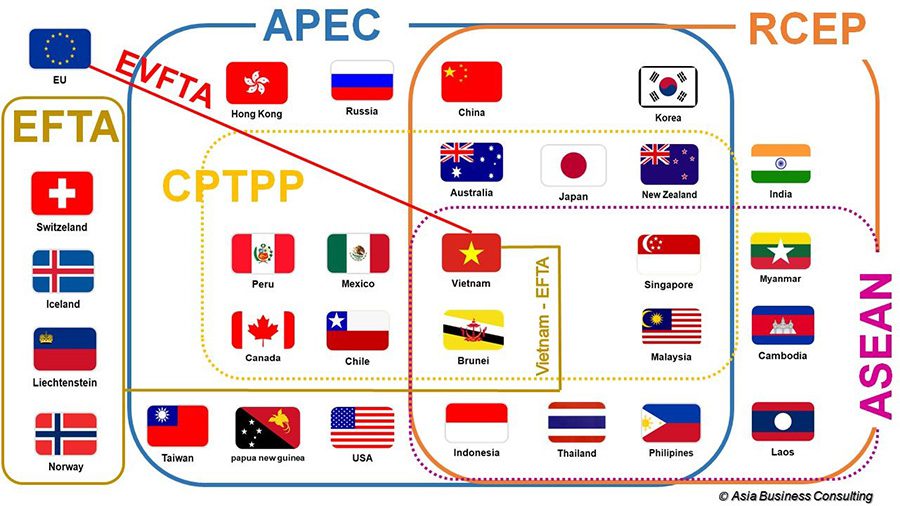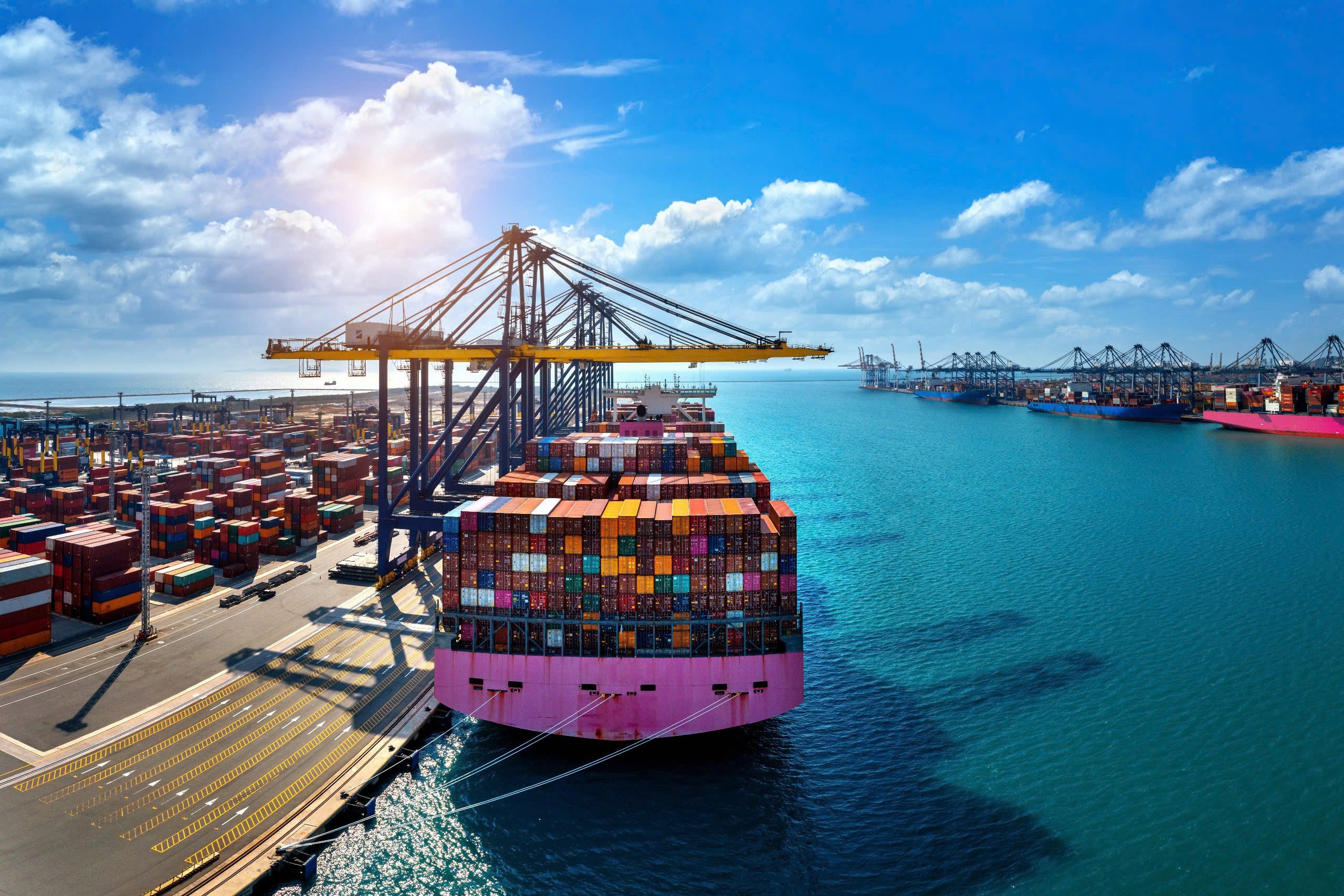Overview of Vietnam’s FTAs
Vietnam has become an attractive destination for international businesses thanks to its favourable policies and diverse network of Free Trade Agreements (FTAs). Currently, Vietnam participates in over 16 FTAs with major partners, including the EU-Vietnam Free Trade Agreement (EVFTA), the Comprehensive and Progressive Agreement for Trans-Pacific Partnership (CPTPP), and the Regional Comprehensive Economic Partnership (RCEP). At the same time, the Vietnamese government has introduced various incentives related to tax, infrastructure, and administrative procedures, creating favourable conditions for foreign businesses to invest and expand production, thereby enhancing global supply chains.
Vietnam’s FTAs include:
- AFTA: ASEAN
- ACFTA: ASEAN, China
- AKFTA : ASEAN, South Korea
- AJCEP: ASEAN, Japan
- VJEPA: Vietnam, Japan
- AIFTA: ASEAN, India
- AANZFTA: ASEAN, Australia, New Zealand
- VCFTA:: Vietnam, Chile
- VKFTA: Vietnam, South Korea
- VN – EAEU FTA: Vietnam, Russia, Belarus, Armenia, Kazakhstan, Kyrgyzstan
- CPTPP: Vietnam, Canada, Mexico, Peru, Chile, New Zealand, Australia, Japan, Singapore, Brunei, Malaysia, United Kingdom
- AHKFTA: ASEAN, Hong Kong (China)
- EVFTA: Vietnam, EU (27 members)
- UKVFTA: Vietnam, United Kingdom
- RCEP: ASEAN, China, South Korea, Japan, Australia, New Zealand
- VIFTA: Vietnam, Israel

Vietnam’s Incentives for Foreign Enterprises
Tax incentives and cost reductions
- Corporate Income Tax (CIT): Foreign companies investing in priority sectors such as high technology, renewable energy, and agriculture enjoy a preferential corporate income tax rate of 10% for 15 years (compared to the usual 20% rate), which helps reduce operational costs and increase profits.
- Import tax exemptions and reductions: The Vietnamese government exempts import taxes for equipment, machinery, and materials not produced domestically, facilitating foreign investment in processing and manufacturing industries, thereby minimizing costs and optimizing operations.
- Land use tax incentives: International companies benefit from land tax exemptions and reductions in industrial zones, reducing the investment costs in production infrastructure and logistics.
Infrastructure and industrial park development support
- Industrial parks and economic zones: Vietnam has over 300 industrial parks with modern infrastructure connected to international ports and airports, making it easier for foreign companies to produce and transport goods.
- High-tech zones: Vietnam’s high-tech parks in Hanoi, Ho Chi Minh City, and Da Nang attract many high-tech businesses with special tax and infrastructure incentives, creating ideal conditions for international tech companies.
Simplified administrative procedures and legal support
- Administrative reforms: The Vietnamese government has implemented numerous reforms to streamline paperwork, making it easier for foreign businesses to enter the market. Investment licensing and business registration can now be done online through electronic portals.
- Legal support: Agencies such as the Ministry of Planning and Investment provide legal support for foreign enterprises, ensuring their rights and resolving issues related to intellectual property and investment compliance.
Benefits from FTAs for Foreign Enterprises and Global Supply Chains
Tariff incentives and expanded export markets
- Tariff incentives: FTAs such as the EVFTA, CPTPP, and RCEP allow Vietnamese goods to enjoy preferential tariffs when exported to major markets like the EU, Japan, and South Korea. This enhances the competitiveness of products made in Vietnam, reducing import costs for international businesses.
- Access to large markets: By signing FTAs, Vietnam has expanded opportunities to access markets with strong purchasing power, reducing dependence on a few traditional markets. FTAs also support international businesses in building global supply chains in Vietnam.
Enhancing the quality and competitiveness of Vietnamese goods
- Compliance with international standards: FTAs encourage Vietnamese enterprises to improve product quality and meet international standards for quality and food safety. International businesses can leverage Vietnam’s supply chain for textiles, electronics, and agricultural products, ensuring high-quality products that comply with global regulations.
- Optimizing supply chains: With a developed logistics network, businesses in Vietnam have improved production processes and logistics, creating optimized and flexible supply chains that meet the diverse demands of the international market.
Attracting investment and developing sustainable supply chains
- An ideal investment destination: With favourable policies and a strategic location, Vietnam attracts foreign direct investment (FDI) from global companies. International businesses can establish supply chains in Vietnam at reasonable costs and gain quick access to major markets.
- Technology transfer and workforce development: FDI helps Vietnam access advanced technologies and enhance labour skills. This creates a high-quality workforce, supporting the global supply chain and boosting domestic production capacity.

Challenges and Prospects from Government Policies and FTAs
Challenges in implementation and compliance with international standards Maximizing the benefits of FTAs and preferential policies requires domestic businesses to comply with international quality and safety standards. International companies need to collaborate with reputable suppliers in Vietnam to ensure products meet the desired quality.
Long-term prospects Vietnam continues to improve its policy system and administrative processes to attract more effective investment. Collaborating with international organizations and focusing on high-tech industries will help Vietnam become an important link in the global supply chain, promoting sustainable economic development.
Conclusion
Thanks to the government’s preferential policies and its extensive network of FTAs, Vietnam is solidifying its position as one of the most attractive supply and production centers in Asia. International businesses seeking supply sources can take advantage of preferential tariffs, reasonable production costs, and flexible supply chains in Vietnam. Currently, Vietnam is an ideal destination for foreign investment, helping businesses optimize costs, improve product quality, and increase competitiveness in the global market.
Understand more about Vietnam Advantage: Vietnam’s Climate Advantage: A Key Driver of Economic Growth


